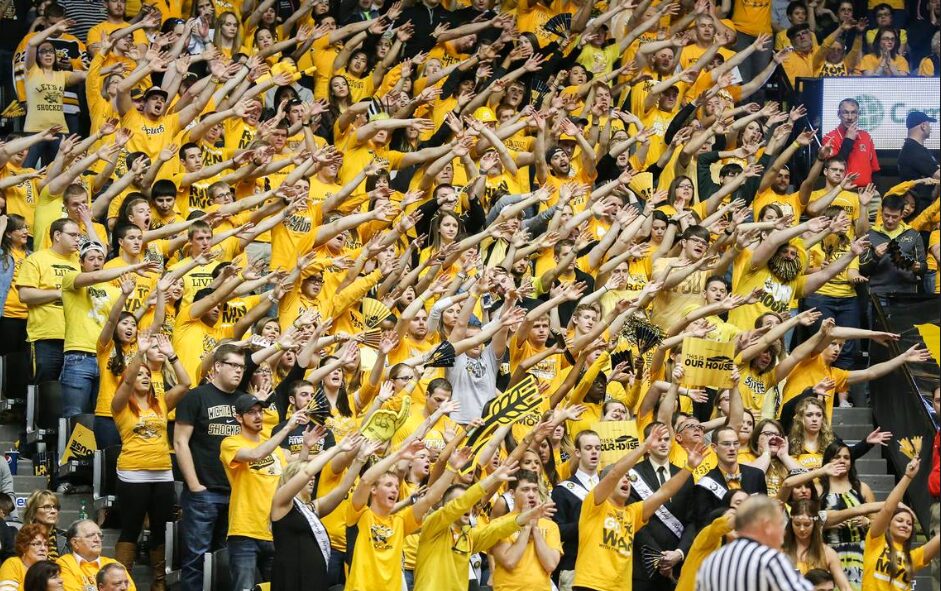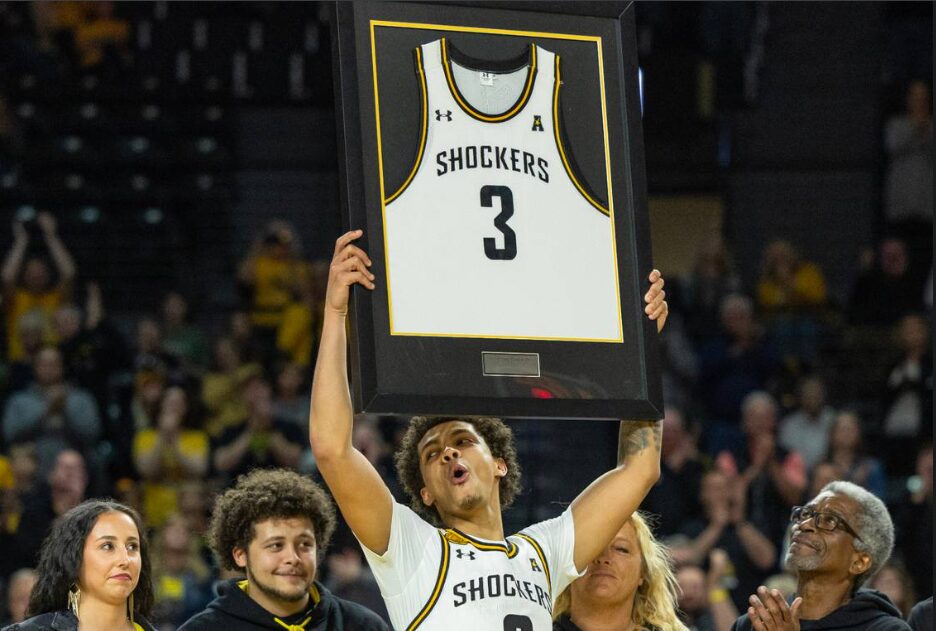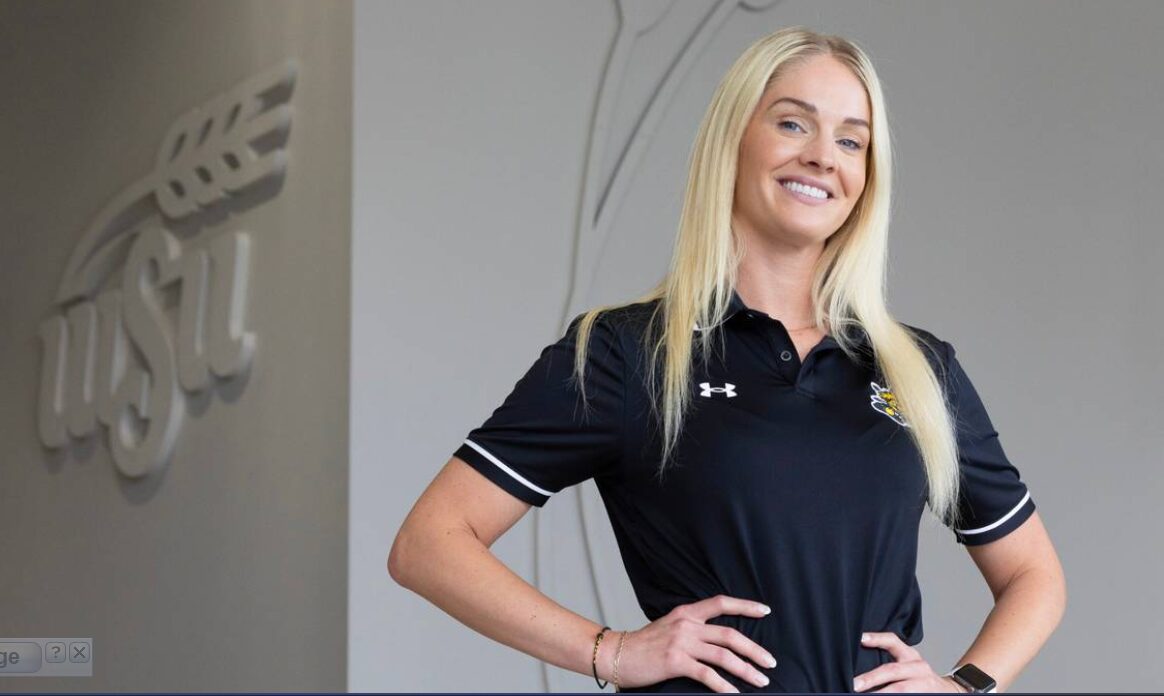
There was a time when Wichita State was a significant contender in the name, image, and likeness (NIL) arena, especially when the Shockers were favorites during March Madness. However, it has been seven years since they last won an NCAA Tournament game in men’s basketball, and when NIL officially launched in 2021, WSU was slower than many to establish a collective for supporting its athletes financially.
In essence, Wichita State fell behind in the competitive landscape of college sports. Since Kevin Saal became athletic director in July 2022, he has been focused on bridging that gap. In his first two years, he has revamped WSU’s collective, which teamed up with Blueprint Sports, rebranded as Wheat Shock Collective, and appointed former Shocker volleyball star Emily Hiebert as its full-time general manager.
While WSU has made progress from its initial setbacks, there’s still much work—and winning—required to fully leverage its potential in the NIL space. Unlocking this potential may be critical to the university’s success in the evolving world of college athletics. Now, it’s up to Saal and Hiebert to make it happen.
“Everyone wants to feel part of something larger than themselves, and it has to represent them with pride,” Saal stated. “We need to excel in this effort, and we’re on the way. People have said before: When Wichita State wins, the entire community benefits. We must get back to that.”

“THEY ARRIVED WHEN NEEDED MOST”
When two former WSU baseball players, Tyler Weber and Tymber Lee, teamed up to establish the first collective for WSU, they never planned to run Armchair Strategies long-term. They saw a need and provided a solution, but both had full-time jobs and were active in the Wichita business scene. Armchair was more of a passion project for them. “We didn’t see this as a way to make money or as a profit venture,” Weber explained. “We all have a deep attachment to Wichita State. I graduated and played baseball there, as did my wife and Tymber. From the start, our goal was to elevate NIL to a level that warranted a full-time commitment.
” Armchair achieved an early success in April 2022 by securing an NIL package that convinced men’s basketball star Craig Porter Jr. to stay out of the transfer portal. However, Weber (from Aegis Group) and Lee (from Wichita Sports Forum) utilized their own businesses to broker the deal, a recurring theme in Armchair’s first year.
They faced some backlash from fans who alleged online that the collective was taking 20% of donations. Weber clarified that while the contracts permitted a 20% fee, Armchair rarely took that much and emphasized that the founders did not profit when they sold the business to Blueprint Sports. Saal praised Weber and Lee for dedicating their time and resources to get the collective up and running.
“The Armchair team stepped in at a critical moment and truly helped the institution when it needed it,” Saal remarked. “They did us a significant favor.” Once Saal was brought on board, the WSU athletic department became much more engaged with Armchair. He began educating student-athletes about NIL, established a marketplace for them through Opendorse, and helped secure the first external NIL funding in January 2023, with three donors committing a total of $450,000 over three years.
By the second year, Saal noted that WSU had moved from having nothing to being able to distribute around $320,000 in NIL funds to its men’s basketball players. This year, according to Saal, there is “substantially more” available, positioning WSU among the top half of the American Athletic Conference. Opendorse projects that men’s basketball distribution in the AAC will average $500,000 this season, highlighting the necessity for the collective to have full-time leadership. Hiebert emerged as the ideal candidate soon after. After enjoying a remarkable volleyball career at WSU, she taught physical education in the Wichita Public School district and coached high school volleyball—not the typical background expected for this role.
However, her recognition within the WSU community made her an excellent fit. Inducted into the Shocker Hall of Fame in 2023, at just 29 years old, she can connect with current student-athletes. She was hired in June, just in time for the 2024-25 school year. “While she didn’t have prior experience in the NIL arena, we knew she would establish strong connections with boosters and alumni thanks to her name recognition,” Weber stated.
“The more we proceeded through the interview process, the clearer it became that she was the perfect choice.” The collective began as a heartfelt endeavor for Weber and Lee, who wanted to give back to their alma mater. They felt it was only right to pass the reins to another former WSU athlete, someone who truly understands the significance of Shocker sports to the Wichita community.
“Wichita State athletics has greatly influenced my life,” Hiebert shared. “It’s incredible to return in this new capacity and contribute in any way I can because I want to see us succeed and help all our athletes thrive.”

‘SHE HAS THAT INSTANT TRUST AND CREDIBILITY’ Exactly how involved schools can be in the NIL process is still evolving with every court ruling, but there is one certainty: having a full-time specialist on campus is an advantage. Wichita State has joined the growing trend of schools to not only help pay for a full-time NIL general manager, but to also house them in their athletic department.
WSU negotiated a deal with Blueprint Sports where 90% of every NIL dollar donated will go to the student-athletes, while the remaining 10% will cover administration costs. So while Hiebert is technically employed by Blueprint Sports, she has an office inside Koch Arena situated right next to senior administration. Any question she has, she is surrounded by people who likely have the answer in Saal, Madison Stein-Mason (external affairs), Kent Hegenauer (business operations), Brad Pittman (facilities and operations) and Taylor Spyker (health and performance). “It’s been so helpful in the learning process of this,” Hiebert said.
“They’re literally right there, so I can just hop into their office whenever and ask them a question. They’re always there to help.” In the nonstop world of name, image and likeness, no day looks the same for Hiebert. When she’s not monitoring policy changes, court rulings and portal windows, she’s busy fundraising, event planning and coordinating with WSU head coaches.
A benefit of partnering with Blueprint Sports, which runs two dozen other collectives, is that Hiebert has connections to other NIL general managers to ask specific questions or speak in general about how to operate on a day-to-day basis. So far her favorite part of the job has been arranging for Shocker athletes to fulfill their NIL obligations by volunteering to help local nonprofit organizations. This summer alone, WSU athletes spent time with Wichita Children’s Home, Starkey, Kansas Food Bank, American Legion, YMCA and Habitat for Humanity. “It has been amazing to see how they can impact the community,” Hiebert said.
“But also it’s been great to see how the work has impacted our student-athletes.” In such a new position, there is plenty of learning to do. But Hiebert has proven to be a natural at the relationship-building part of the job. Saal has noticed how Hiebert’s credentials as a past Shocker great have helped her in that area.
“I’ve seen how the credibility of being a Shocker and a former athlete has played huge with our young people here,” Saal said. “She has that instant trust and credibility with that. And she gets after it. There’s not a whole lot that sits on her desk for long. She’s an educator. She was teaching young people. And ultimately, that’s what we’re doing is educating, so that’s a great place to come from.”

“WICHITANS LOVE TO WIN”
The challenge Hiebert—and leaders of collectives everywhere—faces is the reluctance among donors to accept NIL. Many have long been told that paying players is wrong, which makes it difficult for some boosters to adapt to this new reality. Others are deterred by the belief that funds are being spent on frivolous items.
Additionally, a few outright reject the idea of compensating players. Changing the minds of these skeptics and opening previously closed doors is now Hiebert’s main responsibility. “This is a crucial time for Wichita State to remain competitive with other schools nationwide,” Hiebert stated. “I understand that some may not support NIL at the moment, but it’s here to stay. To compete effectively, we need to continue working on and expanding this effort.”
Saal views the situation even more starkly: schools must either adapt or be left behind. “In this environment, you can’t disconnect championship programs from NIL,” Saal asserted. “We may desire championships while opposing NIL, but those ideas can’t coexist. You won’t win titles without some level of NIL involvement. There’s a baseline investment required for effective recruiting, so we need to embrace this, and Emily is here to help us do that.”
Saal believes that $ 2.5 million is the target amount WSU’s collective needs to secure a position among the top third of the American Athletic Conference in men’s basketball, baseball, volleyball, women’s basketball, and softball, which would enable the Shockers to compete for championships and effectively recruit and retain talent. Saal and Hiebert are approaching this challenge similarly to how a head coach rebuilds a program.
“When rebuilding, you start by promoting yourself and your vision,” Saal explained. “You’re selling core values, student-athlete development, and a commitment to championships. It’s no different from recruiting. Some will generously contribute right away, while others will wait to see results, and that’s fine.”
Another factor is that the efficacy of Saal and Hiebert’s vision will ultimately hinge on the success of the Shockers. While Saal notes there has been “significant” growth in donations, he acknowledges there is still “a long way to go.” The fastest route to achieving their goals lies in WSU, particularly in men’s basketball, securing wins. “You can emphasize core values and program principles, but once people witness success, it lends credibility to what you’re promoting,” Saal explained. “As we work toward our goals, once we start making progress, it will build momentum, and people will want to be part of that success.”
After two years of engaging with the WSU fan base in the business community, Weber has sensed a strong desire for the Shockers to return to prominence in men’s basketball. Fans miss the excitement of 30-win seasons, championships, and NCAA tournament appearances. He is optimistic about the efforts of Saal and Hiebert, believing that if WSU begins to show even a hint of returning to past successes, the collective will thrive as a result. “People in Wichita enjoy winning.
This city is filled with entrepreneurs and successful business leaders,” Weber remarked. “History shows that when we have strong teams, people come out to support them. Not only do they want to see victories on the court and field, they also want to be involved and contribute financially. There’s tremendous potential for NIL here.”

Leave a Reply